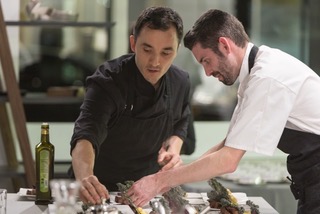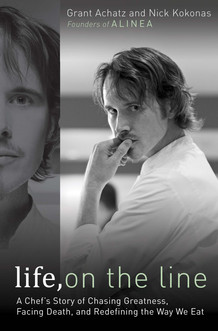
Tasting what you are preparing and also the food being made by your cooks is a huge part of maintaining consistency and setting standards in a kitchen. Ideally, it is through your sense of taste, smell and ability to verbalize it all to another that a chef can instill the dynamic of their palate to their staff especially during the opening stages of a restaurant.
This constant tasting can burn out our taste buds, fulfill our cravings for different foods and leave us satiated before any real meal is consumed. Unless a chef is coming from a fast, which I recommend to avoid this gluttonous outcome, it would be rare for them to get a real deep craving for any type of food, sweet, bitter, sour, salty or umami. Although it might only be a bite here or there, it is enough to quench the palate.
So, how can a chef execute his dishes and maintain his palate and diet?
I recently read an article in the New Times interviewing Miami’s own celebrity chef Michelle Bernstein. The article was covering a story in Parade magazine titled How Top Chefs Stay Slim. I have yet to meet Bernstein but respect her as a chef and her involvement with Common Threads and bringing healthy vending machines into schools in Miami. I have to disagree with the statement she made in this article about chefs needing to taste to the point that they consume 800-1000 calories a day before having a meal. That is ridiculous, and I will prove otherwise in a minute.

First, I need to go back to another recent appearance that she made on NBC. Yes, I am following her. I am looking to get involved with like minded chefs here in Miami. I feel I could bring this “chefs promoting healthy eating” to another level, but obviously not alone. I may be nitpicking but was thrown off a little by the recipe she prepared while supporting the book Smart Chefs Stay Slim on the Today Show. It was the big old piece of stale white bread that she threw into her would-of-been healthy Romesco sauce. I actually got sad for a second and just thought… That sucks, she just hasn’t got that far yet.
Now, about the misconception that we must personally taste everything in order to produce and remain consistent. One example is chef and author of Life, on the Line, Grant Achatz of Alinea in Chicago. Grant’s remarkable journey is like no other. After opening Alinea in 2005 and a year later named best restaurant in America by Gourmet Magazine, he was diagnosed with stage four tongue cancer. Opting for the chemotherapy and radiation instead of removing the muscle and replacing it with another muscle, his tongue was burned, the lining of his esophagus shed and all of his taste buds destroyed.
Do you think the world renowned Alinea closed its doors? Hell No! What Grant did was train and put trust in his sous chefs and cooks to mimic his palate, as should all chefs that want to actually sleep easy on their day off. I highly doubt any one of the guests that continued to wait 2 months for a table here noticed that he was not the one tasting each of the 23 courses they were served. I could bet that not many of those final presentations were tasted by anyone. After the treatment, Grant’s taste buds did come back little by little and he now says, “It was very educational for me. I don’t recommend it, but I think it made me a better chef because now I really understand how flavor works.”
And the best example of this misconception is my own experience. To this day I have never told an employer that I only have half of my taste buds. At 15 years old I underwent my first ear surgery to remove a cyst that eaten away my whole inner ear on the left side, leaving me deaf in that ear as it made its way to the lining of my brain. In order to remove this malevolent growth that had branched out in different directions taking parts of my outer ear with it, they had to severe the glossopharyngeal nerve that controlled my taste buds. The whole left side of my tongue has no taste or sensation and never came back. Luckily they were able to implant a plastic hearing mechanism to replace around 30% of my hearing.
I had been in culinary school and working in the industry for two years at this point. I did not have any taste at all for close to three months after this and also for each of my two surgeries to follow in 1997 and 2006. In fact, everything tasted metallic for quite some time as I was journeying around the best restaurants in Boston and building my foundation as a chef. Gradually the right side came back after each surgery. I sure am crossing my fingers today that this reoccurring condition does not come back.
Not once during any of the phases of little taste, no taste and only tasting metal was my food thrown in my face by an emphatic chef for the flavor being off. Like I said I never told them and nor did they catch on in any of the demanding 4 star formal kitchens I may have been working in at the time.
The moral of this story is that a chef does not need to ingest anywhere near even 100 calories a day to just tasting. In the beginning stages of your career and while opening a restaurant, yes, you do have to taste quite a bit. But what does it take to coat your tongue, a half teaspoon? As chefs we train those around us to mimic our palate, God forbid we end up in a situation like Grant. And furthermore, if the food you were tasting were nutrient dense, clean and free of toxins, the calories wouldn’t be so bad anyway.
